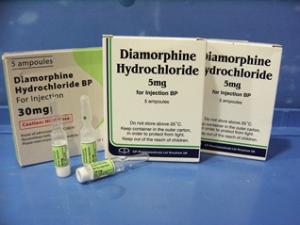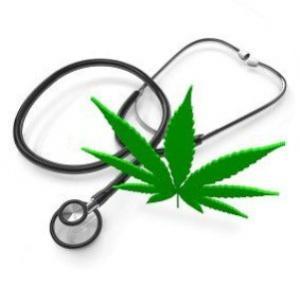They called him "Mr. Methadone" for a reason.
Advocates are hoping a campaign aimed at changing public opinion can do what the courts have so far failed to do: kill the law.
Hint: It's located between Canada and South Dakota.
These powerful substances are making their way into the heart of the psychology establishment and starting to be understood as powerful therapeutic tools.
Some groundbreaking research begins to look for answers.
A new bill in Guam would allow home cultivation, Oklahoma officials still have issues with the voter-approved medical marijuana initiative, and more.
A Mississippi sheriff is in a heap of trouble, a Mississippi prison guard gets caught with contraband.
New Jersey's Senate president says marijuana legalization is coming "soon," the Norwegians begin moving toward heroin-assisted treatment, and more.
North Dakota becomes the second state (after Michigan) to qualify a marijuana legalization initiative this year, Denver's mayor comes around on legalization, the UN will review marijuana's status under international law, and more.
The Marijuana Policy Project picks a veteran criminal justice advocate as its new head, Canada's most populous province makes a last-minute switch from state-run to privately-run pot shops, and more.
Dr. Robert Newman died earlier this month after being struck by an automobile earlier this summer. He was 80 years old.

Bob Newman at a Beth Israel staff meeting in 1985 (Arthur H. Aufses Jr. MD Archives at Mt. Sinai)
If any one man can be credited with carving out a space for the use of methadone as a treatment for heroin addiction, he is that man. Working as a New York City public health doctor in the 1960s, he was given the task of ensuring that heroin addicts who wanted treatment could get treatment with methadone. His boss, city health department head Gordon Chase, told him he would be known as "Mr. Methadone."
While he did not achieve the goal of providing treatment to everyone who wanted it, Newman oversaw the rapid expansion of the city's fledgling methadone program in the early 1970s. The number of patients on methadone went from a handful to more than 10,000 in two years, and 35,000 by 1975.
And he stood up for those patients. When the NYPD wanted Newman to turn over patients' methadone records, he refused. Instead, he took to the courts to defend his patients' right to privacy -- and he won.
After that, he devoted his career to advocating for evidence-based treatment, traveling the country and the world and picking up a second moniker, "the methadone pope," as he advanced harm reduction ideas decades before they became popularized.
He faced opposition from abstinence and 12-step proponents, as well as from elected officials like New York City Mayor Rudy Giuliani, who in 1998 tried to shut down the city's methadone program on the moralistic grounds that it merely substituted one addiction for another. The diplomatic Newman didn't challenge Giuliani head on but instead used interviews to make his case that methadone treatment allowed addicts to lead productive lives.
Newman also advocated for a humane approach toward addicted mothers and pregnant women, supporting groups such as National Advocates for Pregnant Women in their fight against the demonization and criminalization of those women. He was a drug policy reformer who served for decades on the board of the Drug Policy Foundation and then its successor the Drug Policy Alliance.
As this century's opioid epidemic deepened, Newman was cautiously optimistic that the work he had begun decades earlier would help further destigmatize addiction. "I'm hoping that pragmatism will win out," he said. "As more and more Congresspeople, people in the general community and physicians have children who develop a problem with prescription drug use and can't get treatment for it, I think it will make people more receptive to opening doors to treatment."
Newman was not only an influential physician in addiction issues, he was a giant in the hospital world as a whole. He served as President of Beth Israel Medical Center in New York, and then of the entity that acquired Beth Israel along with other facilities -- and then of the entity that acquired that entity. But one could still talk him at a drug policy conference, or send him an email, and you'd get an email back.
Dr. Robert Newman's contribution to an enlightened approach to addiction cannot be overstated. He will be missed, but his legacy lives on.
(Read Bob Newman's 1998 interview with this newsletter here.)
back to top
For 20 years, Wisconsin prosecutors have used a state law, the Unborn Child Protection Act of 1998 (Act 292), to jail adult pregnant women suspected of using drugs or alcohol. Supporters claim the "cocaine mom" law protects fetuses from maternal drug abuse, but critics say the law's language is vague, that it deters pregnant women from seeking prenatal and other health care, and that it unnecessarily and unconstitutionally forces some pregnant women into treatment and state supervision.
The law was found unconstitutional by a federal court last year, but state Attorney General Brad Schimel appealed, and the US Supreme Court allowed the law to stay in effect until the case was decided. But in June, the 7th US Circuit Court of Appeals
dismissed the lawsuit on the grounds that the plaintiff, Tammy Loertscher, had left the state.
Loertscher was 14 weeks pregnant and residing in Medford in 2014 when she tested positive for methamphetamine. Although she told her doctor she had stopped using the drug when she realized she was pregnant, a judge ordered her into inpatient drug treatment. She was then jailed until she agreed to be drug tested throughout her pregnancy. She gave birth to a healthy male child in 2015.
Loertscher was by no means alone -- hundreds of pregnant women have been accused of "unborn child abuse" under the law -- and the dismissal of the case means pregnant women in the state remain in jeopardy.
At the time of the dismissal, attorney Nancy Rosenbloom, director of legal advocacy for National Advocates for Pregnant Women (NAPW), decried the ruling.
"Today's decision means that all women in Wisconsin have to worry that when they seek health care, if there's even a chance they might be pregnant, the state can take them into custody, lock them up in a drug treatment program, a mental hospital or a jail -- whether or not drug treatment is really needed," she said.
Now, Rosenbloom and NAPW are taking the fight to a new arena: the court of public opinion. They have joined forces with a three-year-old national group, Reproaction, to take on the law. The group is forthright about what it wants: "Reproaction is a new direct action group forming to increase access to abortion and advance reproductive justice. We are proud of our left-flank analysis, and are not in this fight to protect the past or maintain the status quo," the group says on its web site.
Reproaction has created the #WIFights 292 campaign to take the fight to the public. The campaign is planning educational fora across the state, a social media campaign, and information pickets, among other tactics.
"All people who experience pregnancy, including pregnant women in Wisconsin, deserve access to appropriate, confidential health care without fear of losing their rights to medical decision making, privacy, and liberty," #WIFight292 explains on its web site.
"At Reproaction, we center our work around the women in Wisconsin who may be targeted by enforcement of Act 292. We are organizing activists and community leaders across Wisconsin to demand action from those in power and channel community into a movement to advance reproductive justice that will ultimately dismantle Act 292. We know that direct action gets the job done, and we will take bold action to educate the public about and put a stop to enforcement of Act 292."
For Rosenbloom and the medical and public health groups that oppose the law, the hope is that the campaign can do what the courts have failed to do: kill a bad law.
"This law only harms women and children," she said.
This article was produced by Drug Reporter
, a project of the Independent Media Institute.
back to top
Much attention this year has been focused on marijuana legalization efforts in state legislatures, particularly in the northeast and mid-Atlantic states, but unless Albany and Annapolis and Trenton get their acts together in a hurry, they could be upstaged by a prairie upstart: North Dakota.

Theodore Roosevelt National Park, North Dakota (GoodFreePhotos.com)
North Dakota Secretary of State Al Jaeger announced Monday that a
marijuana legalization initiative sponsored by the grassroots group
Legalize ND has qualified for the November ballot. The group had handed in more than 17,000 raw signatures last month and needed 13,452 valid voter signatures to qualify. On Monday, Jaeger reported 14,637 signatures were valid.
"The Legalize ND campaign was able to successfully channel the grassroots enthusiasm for recreational marijuana," said Legalize ND chairman David Owen.
Nine states and the District of Columbia have legalized marijuana since 2012, but all of those states have been in the West or the Northeast. This year, with marijuana legalization on the ballot in Michigan as well as North Dakota, legal weed could make a heartland breakthrough.
The North Dakota initiative has some unique features. Here's what it would and wouldn't do:
- It would legalize marijuana -- in all its forms -- for people 21 and over by removing marijuana, THC, and hashish from the state's controlled substances schedules.
- It would provide for the expungement of criminal convictions for anyone convicted of a marijuana-related crime that would be legal under the measure.
- It does not set any limits on how much marijuana people could possess or how many plants they could grow.
- It does not create a framework for regulated marijuana sales nor does it set any taxes. Creating a system of taxed and regulated marijuana commerce would be up to the state legislature.
It's only been two years since North Dakota voters approved a medical marijuana initiative, and the state Health Department is still in the process of setting up a system for producing and distributing the drug. That same year, marijuana legalization supporters came up short on signatures to get on the ballot, but they persevered, and here we are.
North Dakota is a deep red state -- Donald Trump got more than twice as many votes as Hillary Clinton in 2016 -- but the only poll done so far has the initiative leading. The June poll, commissioned by Legalize ND and conducted by the Florida-based Kitchen Group, had the initiative winning 46 percent to 39 percent, with 15 percent undecided.
That's good but not great news for Legalize ND. Yes, the initiative is leading, but the conventional wisdom among initiative and referendum watchers is that campaigns should be starting off with at least 60 percent support -- the assumption being that inevitable organized opposition is going to eat away at support levels in the final weeks of the campaign.
And there will be organized opposition. The North Dakota Sheriffs and Deputies Association passed a resolution in May opposing legalization and, now that the initiative has made the ballot, is meeting this week to plot strategy to defeat it.
Association president Pat Rummel, the Billings County sheriff, told the Associated Press this week law enforcement worried about potential problems such as impaired driving, more domestic disputes, and more strain on mental health and addiction treatment facilities.
"We don't have enough facilities to take care of these people," he said. "That's going to be a huge impact, too. Where do we put all these people that need to be into treatment?"
The national anti-legalization group Smart Approaches to Marijuana will also join the effort to defeat the initiative, the group's leader, Kevin Sabet, told the AP. "Our nation is dealing with a five-alarm fire of addiction right now; the last thing we need is more states to throw gasoline on it by promoting more drug use," he said.
That's the tenor of the opposition arguments so far. The question is whether North Dakota voters will still be swayed by such arguments. We'll find out in November.
This article was produced by Drug Reporter, a project of the Independent Media Institute.
back to top
Research presented at the American Psychological Association's annual meeting in San Francisco last weekend is illuminating the rapid advance of psychedelic science. New findings are adding to a growing mountain of evidence that psychedelics could be effective at treating a range of psychological problems, including post-traumatic stress disorder (PTSD), depression, and social anxiety.
The research could be laying the groundwork for legal prescribing of psychedelics including MMDA (ecstasy), ayahuasca, LSD, and psilocybin (magic mushrooms). But that's a way down the road: All of these drugs are currently illegal, classified as Schedule I under the Controlled Substances Act. (The two plants that combine to make ayahuasca are not illegal, but DMT, the mind-altering ingredient in ayahuasca, is.)
Researchers began studying psychedelics for their potential healing benefits after the discovery of LSD in 1943, but that research came to a screaming halt in the 1960s, when psychedelics were criminalized in the wake of their widespread adoption by the counterculture. Recent years, however, have seen an efflorescence of interest in the therapeutic benefits of the substances -- and it's starting to pay off.
"Combined with psychotherapy, some psychedelic drugs like MDMA, psilocybin, and ayahuasca may improve symptoms of anxiety, depression and post-traumatic stress disorder," said Cristina L. Magalhaes, Ph.D., of Alliant International University Los Angeles, and co-chair of a symposium on psychedelics and psychotherapy. "More research and discussion are needed to understand the possible benefits of these drugs, and psychologists can help navigate the clinical, ethical and cultural issues related to their use."
In one study, researchers questioned 159 participants about their spirituality, their relationship with their own emotion, and their use of hallucinogens. Laurentian University's Adele Lafrance, Ph.D., reported that psychedelic use correlated with higher levels of spirituality, which were associated with fewer symptoms of anxiety and depression and improved emotional stability.
"This study reinforces the need for the psychological field to consider a larger role for spirituality in the context of mainstream treatment because spiritual growth and a connection to something greater than the self can be fostered," said Lafrance.
An ayahuasca study found similar results. That study suggested the drug could help relieve addiction and depression, as well as helping people cope with trauma.
"We found that ayahuasca also fostered an increase in generosity, spiritual connection, and altruism," said Clancy Cavnar, Ph.D., with the Núcleo de Estudos Interdisciplinares sobre Psicoativos (Nucleus of Interdisciplinary Psychoactive Studies).
Another study, led by Alicia Danforth, Ph.D., of the Los Angeles Biomedical Research Institute at the Harbor-UCLA Medical Center, found that a combination of psychotherapy and MMDA could treat social anxiety in adults on the autism spectrum. In that study, 12 participants with moderate to severe social anxiety twice given doses of MMDA and treated with psychotherapy, and they showed significant, long-lasting reductions in anxiety.
"Social anxiety is prevalent in autistic adults and few treatment options have been shown to be effective," said Danforth. "The positive effects of using MDMA and therapy lasted months, or even years, for most of the research volunteers."
Yet another study examined the use of psilocybin in reducing stress and anxiety in people suffering from terminal cancer. In that study, 13 subjects were given psilocybin in conjunction with psychotherapy. Researchers found that the experience helped subjects grapple with their feelings about death and develop new understandings of dying.
"Participants made spiritual or religious interpretations of their experience and the psilocybin treatment helped facilitate a reconnection to life, greater mindfulness and presence and gave them more confidence when faced with cancer recurrence," said Gabby Agin-Liebes, a doctoral candidate in psychology at Palo Alto University, who conducted the research.
After a decades-long lacuna, psychedelic science is back. How long that will take to translate into psychedelics becoming legally available by prescription remains to be seen, but the groundwork is being laid right now.
back to top
Microdosing psychedelics has been a thing for awhile now. It is the practice of ingesting drugs such as LSD or psilocybin (the stuff that puts the magic in magic mushrooms) in amounts too small to create a psychedelic experience in a bid to improve focus and creativity, boost mood, or quell anxiety.

LSD blotters. How much is a microdose? (Creative Commons)
Microdosing has developed a laudatory literature -- see Ayelet Waldman's 2017
A Really Good Day: How Microdosing Made a Mega Difference in My Mood, My Marriage, and My Life and Michael Pollan's 2018
How to Change Your Mind: What the New Science of Psychedelics Teaches Us About Consciousness, Dying, Addiction, Depression, and Transcendence -- but next to no serious scientific study.
Until now. In findings first presented at the June Beyond Psychedelics conference in Prague (and to be published as three separate research papers later this year), University of Toronto researchers offered fascinating insights into the how, why, and results of using small amounts of psychedelics for therapeutic effects.
In a research announcement, cognitive neuroscientist and study coauthor Thomas Anderson said his interest in the topic was sparked when reviewed the scientific literature and found plenty of anecdotal reports but a lack of scientific research on the practice.
"There's currently a renaissance going on in psychedelic research with pilot trials and promising studies of full-dose MDMA (ecstasy) use for post-traumatic stress disorder and of psilocybin use within healthy populations or to treat depression and end-of-life anxiety," said Anderson. "There hasn't been the same research focus on microdosing. We didn't have answers to the most basic epidemiological questions -- who is doing this and what are they doing?"
Anderson and a team of researchers decided to do something no one had done before: ask the users themselves about their experiences. The researchers identified microdosing communities on Reddit and other social media forums and sent them an anonymous online survey asking about the quantity and frequency of their psychedelic use, reasons for microdosing, effect on mood, focus and creativity, and the benefits and drawbacks of the practice. The survey generated 1.390 initial responses, with 909 respondents answering all questions. Two-thirds of the respondents were either current or past microdosers.
"We wanted to ensure the results produced a good basis for future psychedelic science," Anderson said.
What they found was that microdosers reported positive effects, including improved focus and productivity, better connection with others, and reductions in migraines. Quantitatively, microdosers scored lower than non-microdosers on scales measuring negative emotionality and dysfunctional attitude.
Microdosers did report some drawbacks to the practice, but those were related more to the illegal status of psychedelics than to the practice itself.
"The most prevalently reported drawback was not an outcome of microdosing, but instead dealt with illegality, stigma and substance unreliability," says Anderson. "Users engage in black market criminalized activities to obtain psychedelics. If you're buying what your dealer says is LSD, it could very well be something else."
The survey did help clarify the frequency of microdosing -- most respondents reported using every three days, while a smaller group did it once a week -- and just what constituted a microdose.
"Typical doses aren't well established," said Anderson. "We think it's about 10 mcg or one-tenth of an LSD tab, or 0.2 grams of dried mushrooms. Those amounts are close to what participants reported in our data."
But accurate dosing was another problem area: "With microdoses, there should be no 'trip' and no hallucinations. The idea is to enhance something about one's daily activities, but it can be very difficult to divide a ½-cm square of LSD blotting paper into 10 equal doses. The LSD might not be evenly distributed on the square and a microdoser could accidentally 'trip' by taking too much or not taking enough," Anderson said.
"The goal of the study was to create a foundation that could support future work in this area, so I'm really excited about what these results can offer future research," he explained. "The benefits and drawbacks data will help ensure we can ask meaningful questions about what participants are reporting. Our future research will involve running lab-based, randomized-control trials where psychedelics are administered in controlled environments. This will help us to better characterize the therapeutic and cognitive-enhancing effects of psychedelics in very small doses."
Eventually, the science will catch up to the practice. In the meantime, microdosers are going to microdose. Anderson has a scholarly caution for them: "We wouldn't suggest that people microdose, but if they are going to, they should use Erlich reagent (a drug testing solution) to ensure they are not getting something other than LSD."
This article was produced by Drug Reporter, a project of the Independent Media Institute.
back to top
A new bill in Guam would allow home cultivation, Oklahoma officials still have issues with the voter-approved medical marijuana initiative, and more.
Guam
Guam Bill Would Allow Home Cultivation. Five years after the US territory legalized medical marijuana, access issues have prompted Sen. Louis Muna to file a bill that would allow patients to grow their own at home. The bill got a public hearing Tuesday night, with mostly positive testimony. No word yet on it will get a committee vote.
Michigan
Michigan Lawmakers Call on Governor to Prevent Shutdown of Unlicensed Dispensaries. Temporarily operating dispensaries have permission to stay open until September 15 as they try to obtain state licenses, but a group of state legislators says the state is moving too slowly with licensing and are asking Gov. Rick Snyder (R) to prevent the Bureau of Medical Marijuana Regulation from sending out cease and desist orders to unlicensed businesses on September 16. More than 637 businesses have applied for licenses, but only 16 have been issued so far, and there is only one more licensing board meeting before the deadline. The legislators are calling for the deadline to be extended so patients aren't left in the lurch.
Ohio
Ohio Deadline for Getting Program Up and Running Goes Up in Smoke. The state's medical marijuana program is supposed to be up and running by September 8, but that isn't going to happen. The state Department of Commerce is still selecting businesses that will be issued cultivation licenses. The department says it can issue up to 18 of those licenses before September 8, but that means the first crops won't be ready until November.
Oklahoma
Oklahoma Agencies Still Have "Concerns" Over Legal Medical Marijuana. Interim health commissioner Tom Bates told lawmakers last Wednesday that the Health Board still had concerns about how medical marijuana will be implemented and that a special session of the legislature may be needed to see the program properly implemented. The board wants lawmakers to amend the law so that, among other changes, commercial grows are indoor only, patient home grows are prohibited or require a special license, smokable marijuana is prohibited, THC levels are limited to 12% or less, a pharmacist is required on-site at dispensaries, and that a list of qualifying conditions for patients be created. Some of the changes are among those recommended in the Health Board's first try at setting interim rules, which were retracted in the face of loud public opposition. Any effort to re-adopt them is certain to lead to renewed clamor.
[For extensive information about the medical marijuana debate, presented in a neutral format, visit MedicalMarijuana.ProCon.org.]
back to top

pile-of-cash_180_157.jpg
A Mississippi sheriff is in a heap of trouble, a Mississippi prison guard gets caught with contraband, and more.
In Oakland, Mississippi, the Tallahatchie County sheriff was arrested last Friday on federal drug trafficking and extortion charges. Sheriff William Brewer, 58, is charged with conspiracy to distribute a controlled substance and extortion and bribery under color of official right in violation of the Hobbs Act. He's looking at up to 20 years in prison on each count.
In Brandon, Mississippi, a state prison guard was arrested last Friday after being caught with a cell phone, marijuana, and synthetic cannabinoids as she reported to work. Guard Kimberly Diana Scott, 35, went down when a regular search turned up the contraband. She is charged with introducing controlled substances into a correctional facility.
In Polkton, North Carolina, a state prison guard was arrested Monday for allegedly trying to bring drugs into the prison. Sgt. Casonja Crowder, 34, is charged with felony conspiracy to deliver marijuana and suboxone to an inmate and felony possession of marijuana and suboxone. She has now resigned her position.
back to top
New Jersey's Senate president says marijuana legalization is coming "soon," the Norwegians begin moving toward heroin-assisted treatment, and more.

diacetylmorphine AKA pharmaceutical heroin -- coming soon to Norway to treat hardcore addicts (Creative Commons)
Key New Jersey Pol Says Legalization Coming "Soon." "I think it's gonna happen soon," State Senate President Stephen Sweeney (D-Gloucester) told NJ Advance Media Thursday, saying it could happen as early as next month. "We'll have the legislation done. Then you have to do the regulations and everything else." He said he hoped to see a final draft of the bill, next week, hold hearings quickly, and vote in September. "We're getting much closer," Sweeney said.
International
British Police Commissioner Calls for Marijuana Freedom. Police and Crime Commissioner for North Wales Arfon Jones has called for marijuana users to be able to grow and sell the plant without fear of arrest in cannabis clubs. He is calling for the country to adopt Spanish-style marijuana "collectives" where members sell homegrown weed to each other. At least 75 cannabis clubs currently exist in Britain, all operating with a wink and a nod from local police.
Norway to Begin Providing Free Heroin to Hardcore Addicts. Norwegian Health Minister Bent Hoie has asked the Directorate of Health to create a list of heroin addicts must suitable for receiving heroin-assisted treatment and to assess the economic consequences of creating such a program. "We want to help those addicted who are difficult to reach, those who are not part of LAR (drug-assisted rehabilitation) and who are difficult to treat," he said. The pilot program is set to start in 2020 or 2021. Local governments in Oslo and Bergen are reportedly applying to participate.
back to top
North Dakota becomes the second state (after Michigan) to qualify a marijuana legalization initiative this year, Denver's mayor comes around on legal pot, the UN will review marijuana's status under international law, and more.

Denver's mayor opposed marijuana legalization, but now has seen the light. (Creative Commons)
North Dakota Legalization Initiative Qualifies for November Ballot. The secretary of state's office announced Monday organizers of a marijuana legalization initiative had handed in enough valid voter signatures to qualify their measure for the November ballot. That makes North Dakota the second state to qualify a legalization initiative for November: Michigan activists did so earlier this year.
Denver Mayor Changes Tune on Legalization. Mayor Michael Hancock campaigned against the state's successful 2012 legalization initiative, but after five years of legal weed, he's singing a different tune. Prompted by a recent report that touted the city's accomplishments with legal marijuana, Hancock now says the city's approach "is working." He noted that the city was the first large city in the country to take on the "daunting challenge" of legalization, "and we are having success."
International
UN Launches First-Ever Full Review Of Marijuana's Status Under International Law. The World Health Organization's (WHO) Expert Committee on Drug Dependence (ECDD) will launch a first-ever in-depth review of whether marijuana is properly scheduled under international drug control treaties. The group held a "pre-review" earlier this year. "A pre-review is the first step of the ECDD's assessment process, where it is determined whether there is enough robust scientific information to proceed to the next step, called a critical review. This initial evaluation is also an opportunity to identify gaps in the available scientific data. A critical review is carried out when there is sufficient scientific evidence to allow the ECDD to make an informed recommendation that the substance be placed under international control, or if its level of control should be changed."
Canada's British Columbia Begins Drug Testing in Provincial Cities. Responding to a large number of opioid overdose deaths in the province, BC Interior Health has begun funding full-time drug testing services in seven cities in the province. The program provides fentanyl testing strips to local service providers.
Colombia's Defense Minister Says Government Will Forcibly Eradicate Coca Crops. Defense Minister Guillermo Botero said last Friday the government has decided to forcibly eradicate coca crops in the country. Former President Juan Manuel Santos had ended forced eradication in a bid to reduce associated violence, but new President Ivan Duque will go ahead despite the potential for violence in a move that is sure to please the United States.
back to top
The Marijuana Policy Project picks a veteran criminal justice advocate as its new head, Canada's most populous province makes a last-minute switch from state-run to privately-run pot shops, and more.
Marijuana PolicyMarijuana Policy Project Names New Head. The nation's most well-funded marijuana advocacy group has named Steve Hawkins as its new executive director. Hawkins previously served as the executive director of Amnesty International USA, executive director of the National Coalition to Abolish the Death Penalty and executive vice president of the NAACP. "Steve has a strong track record in the field of criminal justice reform, and he knows how to build a movement toward meaningful social change," said Troy Dayton, the chair of MPP's board of directors. "We were not only impressed by his expertise and experience, but also his strong convictions regarding the injustice of marijuana prohibition." Hawkins replaces Rob Kampia, who had led the group since its founding in 1995. Kampia resigned late last year and now runst a consulting group called the Marijuana Leadership Campaign.
Medical Marijuana
Michigan Lawmakers Call on Governor to Prevent Shutdown of Unlicensed Dispensaries. Temporarily operating dispensaries have permission to stay open until September 15 as they try to obtain state licenses, but a group of state legislators says the state is moving too slowly with licensing and are asking Gov. Rick Snyder (R) to prevent the Bureau of Medical Marijuana Regulation from sending out cease and desist orders to unlicensed businesses on September 16. More than 637 businesses have applied for licenses, but only 16 have been issued so far, and there is only one more licensing board meeting before the deadline. The legislators are calling for the deadline to be extended so patients aren't left in the lurch.
International
Ontario Suddenly Switches from State-Run Marijuana Stores to Private Ones. Canada's most populous province has at the last minute discarded plans for state-run pot shops in favor of allowing private businesses to run the stores and allowing consumers to purchase marijuana online for delivery. The late switch means people in Ontario will not be able to go to pot shops when they become legal nationwide on October 17, but will now have to wait for the province's new target date of April 1, 2019. But online sales will begin on day one.
back to top






